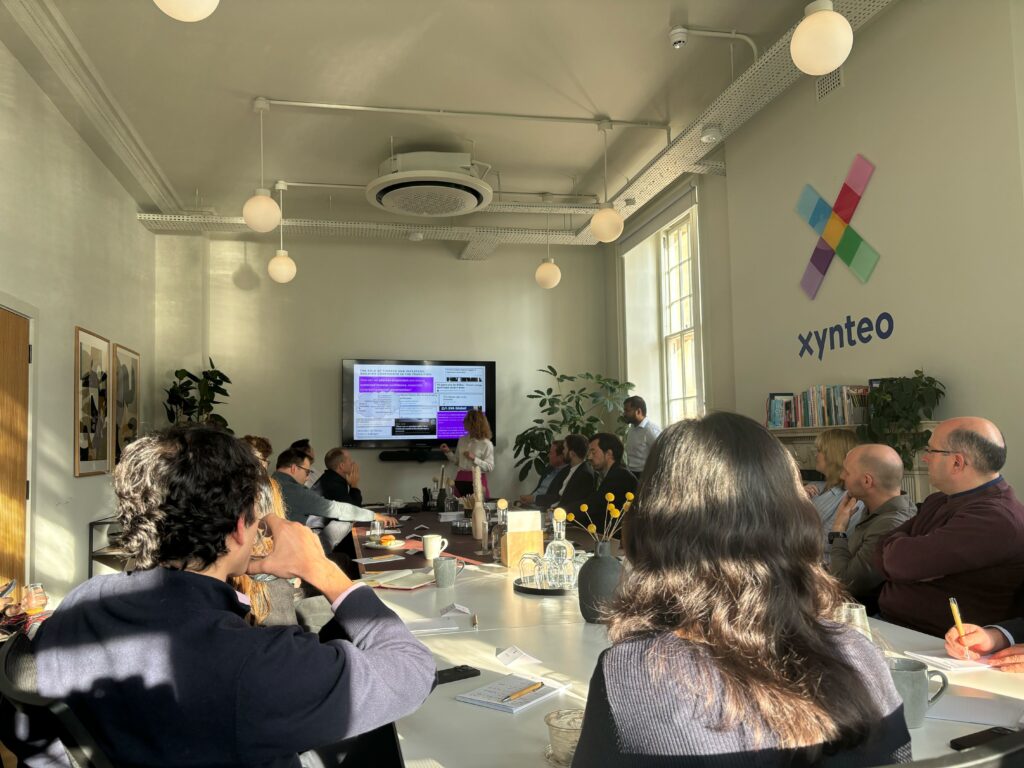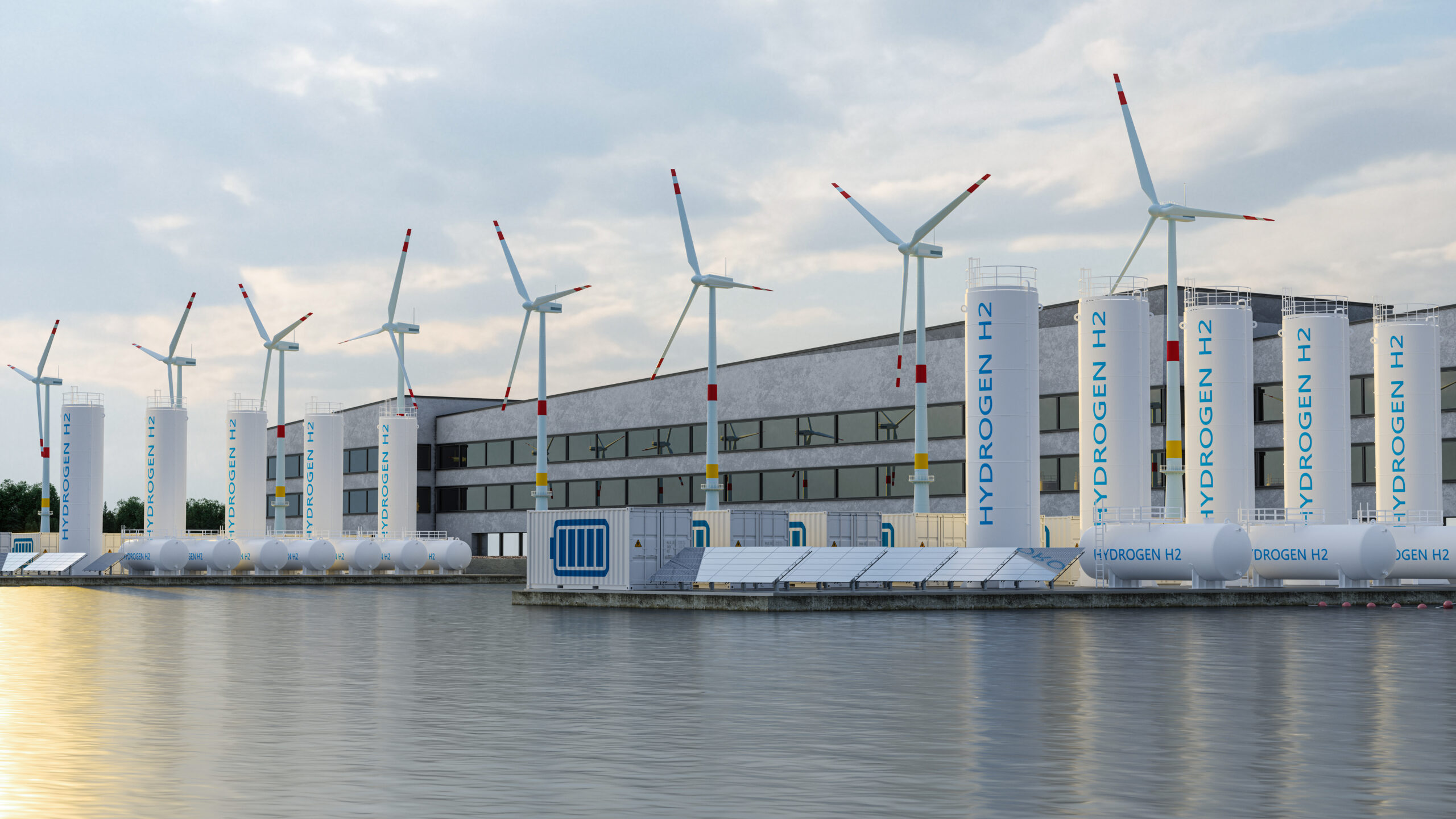Last month, sales of new battery electric vehicles reached a milestone – hitting 25% of all new car sales for November. Yet, even with this good news, the 2035 ban on the sale of new ICE cars is fast approaching, and overall adoption rates are plateauing. And while Zero Emission Vehicle (ZEV) mandate is placing immediate pressure on automakers to scale production, we need renewed urgency across the entire value chain in tackling the systemic changes and innovations needed to drive growth.
At Climate Week NYC in September, Xynteo brought together a wide group of value chain experts for a panel discussion to ask how we accelerate the transformation of our global transportation networks to electric. Continuing and building on this fantastic discussion, Xynteo recently hosted an even wider group of ecosystem leaders and innovators for an inspiring EV Breakfast Roundtable for a discussion on four critical themes:
- Tackling misinformation and buyer sentiment and realising porosity of fear, uncertainty, and doubt (FUD)
- Redefining total cost of ownership (TCO)
- Unlocking the power of open standards and data to support innovation
- Sustaining investor confidence during a period of rapid change
In this article from Xynteo’s Amy Marshall and Ashish Pandey, we unpack some of the key points from the discussion – as we all look to a world of zero emissions, electric transportation.
Navigating Fear, Uncertainty and Doubt: Managing Buyer Sentiment
Misinformation-driven fear, uncertainty, and doubt (FUD) remain a persistent barrier to scaling electric vehicle adoption. This broad societal challenge disproportionately impacts emerging technologies like EVs, with one roundtable participant noting, “It’s not a problem of technology, it’s one of psychology.” Widely circulated narratives on topics like range anxiety, safety concerns, infrastructure inadequacies, and total cost of ownership continue to undermine end-consumer confidence. This is not a new challenge, but one that is consistently replayed despite positive efforts to put it to rest – and no stakeholder group is immune.
Even in the commercial sphere, often regarded as a more rational market, while fleet managers can be convinced of the benefits of transitioning – investment committees, influenced by negative media narratives, may hesitate. FUD trickles into the allocation of capital by financial institutions, while policymakers, swayed by constituent concerns, struggle to deliver the certainty businesses need for investment. Despite these challenges, the roundtable felt that concrete steps can be taken to counteract negative sentiment:
- Establishing a single source of truth: The roundtable acknowledged the value of a balanced, evidence-based repository for EV-related studies and information to dispel doubt and bring clarity across the ecosystem. Collaborative, industry-wide efforts are vital to bolstering credibility and Electric Vehicles UK shared their intent to launch just such a repository on 12th December this year.
- Harnessing the power of real-world experience: One example shared highlighted a pilot programme for electric refuse trucks, where initial interest amongst drivers rose from 30% to near-universal adoption after first-hand exposure. There are lots of these examples out there, showing the power of lived experiences to counter unsubstantiated narratives and build trust.
- Supporting the second-hand EV market: Targeted reassurances and incentives are needed to stabilise the market in the short-to-medium term. Boosting residual values will in turn encourage companies to transition fleets by purchasing new EVs, support manufacturers in meeting the Zero Emission Vehicle (ZEV) mandate and strengthen ecosystem resilience.
Fear, uncertainty, and doubt is a broad societal challenge that often disproportionately impacts emerging technologies like EVs, with one roundtable participant noting, “It’s not a problem of technology, it’s one of psychology.”
Redefining Total Cost of Ownership (TCO): Beyond Financials
The switch to EVs of all classes has long relied on total cost of ownership (TCO) to communicate value. Reaching parity with internal combustion engine (ICE) vehicles continues to be regarded as a key tipping point for the transition, a critical point that has already been reached in many cases – both for personal use and passenger fleets. However, reliance on economic metrics alone will not be enough to increase uptake at the pace required to meet the UK’s net zero targets. To drive faster progress, the industry must present a more comprehensive conception of value, broadening the narrative beyond financial savings to include additional benefits such as carbon reduction, improved air quality, noise reduction, and societal health outcomes.
A holistic “economics-plus” approach has the potential to unlock wider adoption, as well as broadening the benefits case for those vehicle classes that may not yet have reached purchase price parity. Roundtable participants shared the following insights:
- Prioritise sectors with robust reporting: In industries where emissions reporting is well established, companies are increasingly incentivised to demonstrate sustainability leadership to customers focused on reducing Scope 3 emissions and to investors seeking opportunities aligned with institutional sustainability mandates. In sectors like logistics, this creates a compelling opportunity to position an “economics-plus” assessment as a driver of both brand value and competitive advantage.
- Make it personal for the end-consumer: While some TCO+ arguments risk feeling too abstract, real-world driver experience is a powerful way to make the case. Participants noted that insights from behind the wheel resonate deeply, cutting through to individuals and decision-makers alike. When framed effectively, this qualitative data can humanise the experience, building trust and fostering buy-in at all levels of an organisation.
- Act boldly: While data plays a crucial role in quantifying benefits such as improved air quality and operational savings, sometimes the pace of change demands bold, decisive action even when perfect data is unavailable. History shows that early adopters often set benchmarks, shape industry standards, and drive innovation. Waiting for comprehensive data may lead to missed opportunities, particularly in a sector as dynamic as e-mobility.
A holistic “economics-plus” approach has the potential to unlock wider adoption, as well as broadening the benefits case for those vehicle classes that may not yet have reached purchase price parity.



Roundtable attendees included: Advanced Propulsion Centre UK, Electric Vehicles UK, EO Charging, Forvis Mazars, Geotab, Leon Capital, London Luton Airport, Mitie, Railpen, Raw Charging, Tata Communications, Trowers & Hamlins, VEV, Voleum, Zap Map, and Zeti Group
Open Standards and Open Data: Enabling Collaboration and Differentiation
In a complex and evolving sector that requires a multi-stakeholder approach to planning and investment, standardisation and interoperability are key priorities if we are to accelerate the e-mobility transition. Open standards prevent vendor lock-in, can reduce barrier to entry, and allow for creation of globally scalable solutions. When supported by open data platforms – in conjunction governments or industry associations – such openness enables data to be accessed, shared, and collected more effectively. This in turn will be necessary to guide smarter infrastructure development, funding allocation, and facilitating solutions that better meet customer needs.
However, it should be remembered that for smaller or startup organisations—particularly early adopters with significant investments in proprietary protocols and data sets, or those impacted by standards lacking backward compatibility—new requirements can impose substantial strain. The challenge for standard-setting bodies, policymakers and the broader sector, is ensuring progress without overburdening stakeholders and stifling the very innovation these standards are meant to support. Despite progress the EV sector has yet to fully unlock its potential of standards, protocols, and data. Participants noted:
- Unlocking radical collaboration: A culture of trust and shared progress, where collaboration is viewed as a driver of collective success rather than a threat to competitive advantage, is the fastest route to increased market appetite. Yet, as one attendee shared, their company had offered data sharing standard secured through heavy investment and vertical collaboration to their competitors, driven by the belief that “a rising tide raises all boats”. No peer organisations have thus far leveraged this opportunity.
- Understanding the Distinction Between Protocols and Standards: A notable discussion point arose around the difference between protocols and standards, particularly given the background of several attendees with experience in the telecommunications industry, which operates with globally accepted standards like 3G, 4G, and 5G. Participants highlighted a common misconception in the eMobility sector, where protocols such as OCPP and OCPI are often mistaken for standards. Unlike standards, protocols provide flexibility in their implementation, necessitating a robust engineering and technical team to ensure effective deployment and interoperability. This distinction underscored the critical need for technical clarity and expertise in advancing the eMobility ecosystem.
- Education powers data: Open data initiatives, like the one currently being assessed by UK OZEV, can improve transparency and allow stakeholders to standardise metrics and create common frameworks for comparison. However, education on how to effectively interpret and utilise this data is still in its infancy, particularly among some clients and decision-makers. Addressing this gap is essential to drive informed choices and foster trust.
When supported by open data platforms, in conjunction governments or industry associations; open standard enable data to be accessed, shared, and collected more effectively – guiding smarter infrastructure development, funding allocation, and facilitating consumer solutions.
The Role of Finance and Investors: Building Confidence in the Transition
Industrial revolutions are seldom smooth, and the e-mobility sector is no exception. New technologies inevitably produce both winners and losers, and the EV sector is no exception. With adoption rates plateauing, high-profile failures such as Northvolt and Volta, redundancies in traditional OEMs being blamed on soft demand for EVs, and trade tensions resulting from EU and US tariffs on Chinese imports, critical questions arise.
How can investor confidence be maintained? How can companies secure the capital required to scale? And, how, especially during a challenging period in the broader investment landscape, do we accelerate investment? Despite superficially negative sentiment, participants agreed there are significant reasons for optimism:
- Capital availability: Significant funds raised for transition-focused sectors in 2021 and 2022 are now primed for deployment. Large institutional investors are increasingly eyeing opportunities to create new pools of capital and investment mechanisms for e-mobility, driven by the sector’s long-term potential.
- Policy certainty: While changes during the final year of Rishi Sunak’s Tory government saw the UK ZEV target date pushed out to 2035, the new Labour governments continuation of this revised deadline was a positive signal to the industry and finance that the course will be maintained. This certainty has proven a stabilising force, with signs of increasing confidence that demand will return.
- Resilient success stories: While high-profile failures have drawn attention, there have also been many successes, including Tesla’s over 2,000% share price increase across the past decade. Investors remain willing to back high-value opportunities with proven potential.
- The power of data: Legislation like the Public Charge Point Regulations 2023 (PCPR) are equipping the market with more accurate and granular data. These insights enable more informed decision-making, allowing investors to base strategies on actual performance rather than projections, and strengthening confidence across the ecosystem.
Despite superficially negative sentiment, participants agreed that continued capital raising, policy continuity from government, growing success stories, and more accurate and granular data being available are all significant reasons for optimism.
Putting the pedal to the metal
The EV industry, though young, has shown remarkable resilience through significant headwinds. Even in the face of these challenge, the entire industry continues to build the institutions needed to support long-term development, generate investor interest, leverage creativity to drive decisions.
Yet, we cannot be complacent about the opportunities in front of us, nor the work required to realise the future we all seek. Progress hinges on a balanced strategy – addressing systemic barriers while continuing to encourage private-sector innovation around these constraints. Together, these efforts will propel the sector forward and solidify its role in delivering the transition to a sustainable future.
If you would like to get in touch about any of the points raised in this piece, or discuss how Xynteo can help your organisation with its EV transition, contact Amy or Ashish below.
Xynteo is a global advisory firm and community dedicated to driving regenerative growth. Through programmes like Leadership Vanguard, Vikaasa, and the Build Ahead coalition, Xynteo connects leaders across industries to address complex global challenges and create sustainable impact.
–
Amy Marshall
Managing Director, Xynteo
amy.marshall@xynteo.com
Ashish Pandey
Principal, Xynteo
ashish.pandey@xynteo.com



